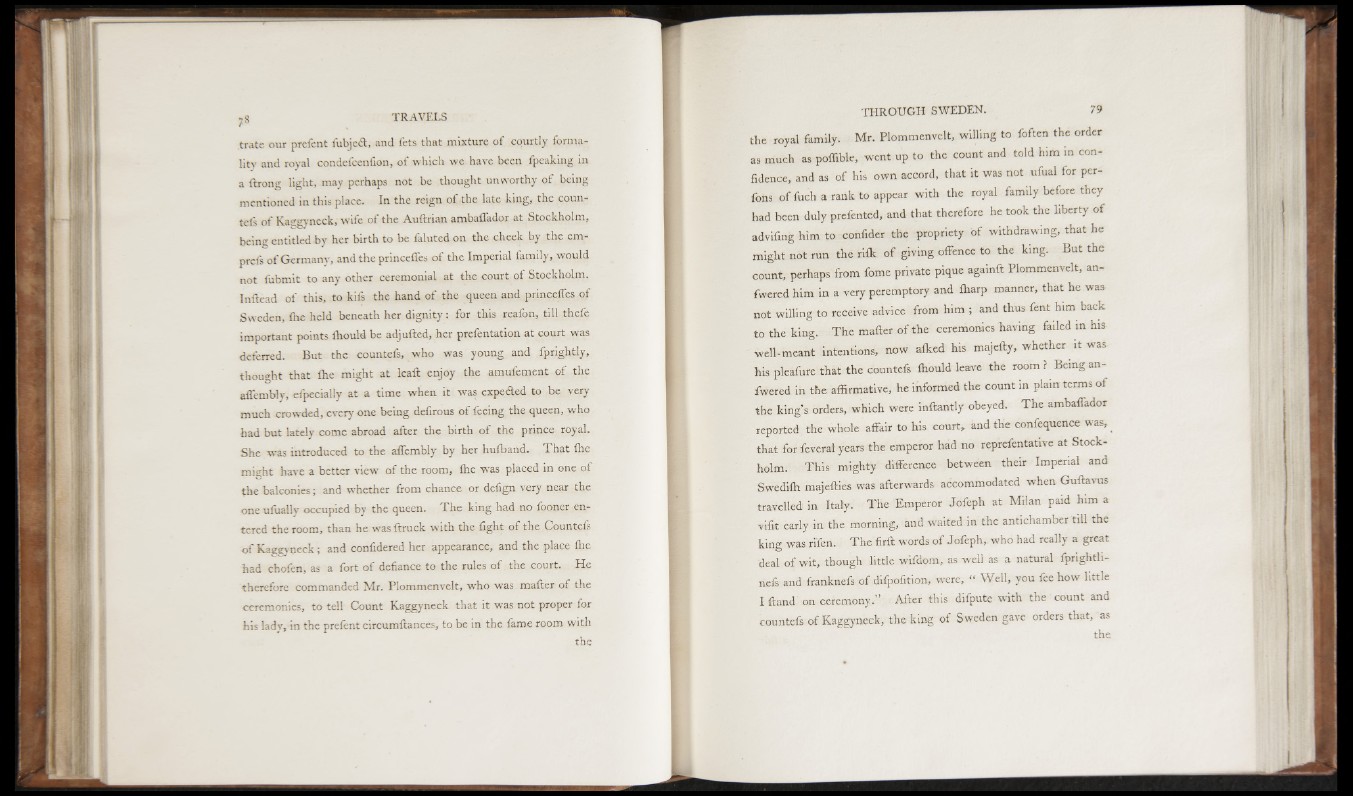
,r8 TRAVELS
trate our prefent fubjecl, and fets that mixture o f courtly formality
and royal condefcenlion, o f which we have been fpeaking in
a ftrong light, may perhaps not be thought unworthy o f being
mentioned in this place. In the reign o f the late king, the coun-
tels o f Kaggyneck, wife o f the Auilrian ambaflador at Stockholm,
being entitled by her birth to be faluted on the cheek by the em-
preis o f Germany, and the princefl.es o f the Imperial family, would
not fubmit to any other ceremonial at the court o f Stockholm.
Inftead o f this, to kifs the hand o f the queen and princeffes o f
Sweden, fhe held beneath her dignity: for this reafon, till thefe
important points ihouH be adjufted, her prefentation at court was
deferred. But the countefs, who was young and fprightly,
thought that fhe might at leaft enjoy the amufement o f the
aflembly, efpecially at a time when it was expected to be very
much crowded, every one being defirous o f feeing the queen, who
had but lately come abroad after the birth o f the prince royal.
She was introduced to the aflembly by her hufband. T h a t fhe
might have a better view of the room, fhe was placed in one of
the balconies; and whether from chance or deiign very near the
one uliially occupied by the queen. T he king had no fooner entered
the room, than he was ftruck with the fight o f the Countefs
o f K aggyneck; and confidered her appearance, and the place fhe
had chofen, as a fort o f defiance to the rules o f the court. He
therefore commanded Mr. Plommenvelt, who was mailer o f the
ceremonies, to tell Count Kaggyneck that it was not proper for
his ladv, in the prefent circumftances, to be in the fame room with
the
the royal family. Mr. Plommenvelt, willing to foften the order
as much as poflible, went up to the count and told him in confidence,
and as o f his own accord, that it was not ufual for per-
foiis o f fuch a rank to appear with the royal family before they
had been duly prefented, and that therefore he took the liberty o f
advifing him to confider the propriety o f withdrawing, that he
might not run the rifk o f giving offence to the king. But the
count, perhaps from feme private pique againft Plommenvelt, an-
fwered him in a very peremptory and fharp manner, that he was
not willing to receive advice from him ; and thus fent him back
to the king. T h e mailer o f the ceremonies having failed in his
well-meant intentions, now aiked his majeffy, whether it was
his pleafure that the countefs ihould leave the room ? Being an-
fwered in the affirmative, he informed the count m plain terms o f
the king’s orders, which were inflantly obeyed. T he ambaffador
reported the whole affair to his court, and the confequence was,
that for feveral years the emperor had no reprefentative at Stockholm.
This mighty difference between their Imperial and
Swedifh majefties was afterwards accommodated when Guftavus
travelled in Italy. T h e Emperor Jofeph at Milan paid him a
vifit early in the morning, and waited in the antichamber till the
king was ri'fen. T h e firft words o f Jofeph, who had really a great
deal o f w it, though little wifidom, as well as a natural fprighth-
nefs and franknefs o f difpofition, were, “ W e ll, you fee how little
I Hand on ceremony.’ ’ After this difpute with the count and
countefs o f Kaggyneck, the king o f Sweden gave orders that, as
the